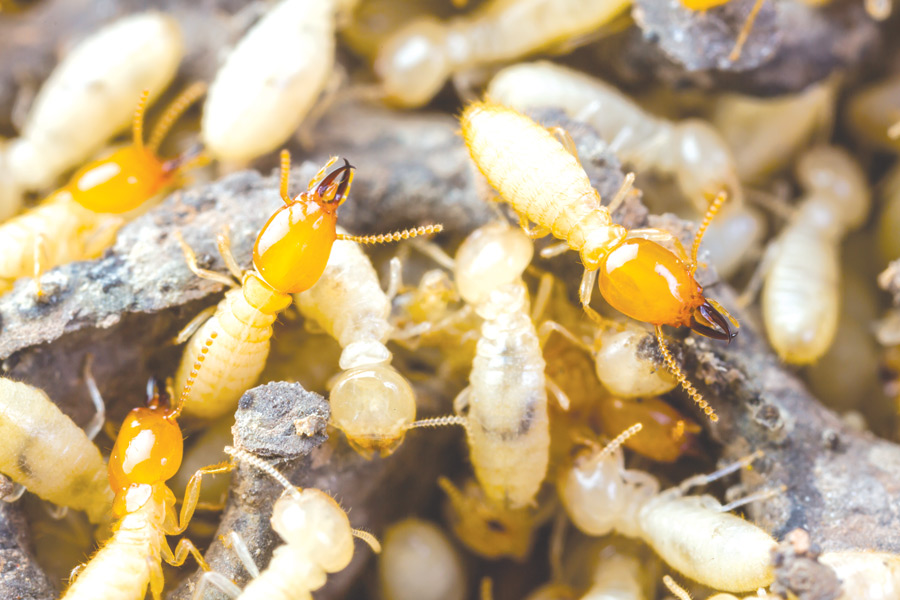CENTRE WELLINGTON – People who live in a termite zone already know how important it is to keep their property clear of dead wood and other conditions that termites like.
But Pat Ellis wishes everyone in Fergus and Elora would garden as if they have termites too, because if they don’t, termites will continue to spread.
“Termites are rampant throughout Elora,” said Ellis, who lives in Elora and has been battling termites in her home and on her property for the past 10 of the 42 years she’s lived there.
“They are spreading down streets and people are not aware. There has to be a community attempt to control them. It’s not an individual problem anymore.”
Ellis and Tammy Rutherford, who lives in Fergus, have been lobbying for Centre Wellington Township to take a leadership role in termite eradication. It’s an issue that has come to council a few times and it is certainly on the radar of many councillors, who are considering if the township could and should fund a termite eradication program. Township staff is expected to bring a report to council in the near future.
“I’ve been trying to raise awareness,” said Rutherford, who started a Facebook page, CW termites, last year. “Termites work 24/7. They never stop. And they spread. But unless someone told you, you wouldn’t know.”
Ellis said she has come to accept that she will have to do a thorough termite inspection every year and have her home treated every four or five years – at a cost of $5,000 – to keep them at bay. But treatment only offers limited protection and doesn’t kill a colony – it only moves them along for a few years, and then they come back.
The termites here are eastern subterranean termites that live underground and feed on wood. They prefer dark, damp conditions and build shelter tubes to travel above ground and work their way into homes.
They forage the yard first and then find their way into the home, so the first rule of gardening in the termite zone is to eliminate dead wood, tree stumps, and other habitat on a property.
“At my home there was a lovely vine growing up one wall. Once I had termites, I had to remove it. It was just a highway for termites,” Rutherford said.
For similar reasons, Rutherford advises people not to plant anything too close to a house. This makes it easier to find shelter tubes when doing an inspection, and also helps with air circulation and allows the sun to dry the soil creating a less hospitable environment for termites.
As well, because of the treatments and the poison it injects into the soil, place vegetable gardens far from treatment areas, she said.
Eradication program
The City of Guelph started an eradication program about 12 years ago and offers this advice on its website:
– decks and porches must be raised off the ground using a minimum of six inches of concrete
– wood elements between six and 18 inches above a ground must be pressure-treated;
– the bottom step of stair stringer must rest on concrete;
– treat fence posts with borate rods;
– use something other than wood for all retaining walls;
– raise and stack firewood and lumber off the ground;
– consider using a using a metal rack, concrete pad, or patio stones for storing firewood;
– place firewood in the sun away from the house;
– raise wooden sheds off the ground;
– do not use a wooden floor for a shed;
– use something other than wood for fence posts, or support pressure-treated wood posts using metal brackets;
– consider metal, vinyl or bamboo fences instead of wood;
– for wood fences, use pressure-treated posts supported on metal post brackets;
– for best results, set brackets in concrete;
– live trees are usually not infested, but dead trees or a heavily infested live tree should be cut down, the stump excavated or chipped, and the chippings removed; and
– make sure downspouts flow water away from the house; clean your rain gutters.
The matter of mulch
Termites feed on wood, not bark. And while they prefer soft woods like pine and spruce and hardwoods like aspen, they aren’t that particular. So when it comes to adding mulch to your garden, stay away from cedar mulch, black, red, or yellow colour enhanced mulch, and wheat straw.
What you can use: bark mulch, pine bark nuggets, cocoa shell mulch, decorative landscape stone, rubber mulch, peat moss (mix in soil), coffee bean husk (mix in soil), coconut husk/coir (mix in soil).
“You should not share plants either,” Ellis said.
“I get concerned with the horticultural society and their plant sales. They do a wonderful job, but nobody in Elora or Fergus really knows if they are in a termite zone because the maps are out of date. Termites can be transplanted so easily.
“And honestly, I think within a 10km radius of Elora and Fergus, they should not allow the selling of wood mulch. It’s very dangerous here.”
Randy Bossence, chief building official with the township, said in an email that residents who know they have termites and that need to remove wood from their property, should contact the township’s building division to set up an inspection of the material.
Once the material is inspected, the homeowner will be advised on how to dispose of it.





I called most of the landscaping supply places in Elora & Fergus looking for termite resistant mulch. Sadly our local experts could not help. A landscaping supply place in Guelph sells pine bark mulch for the same price as the types of mulch that termites love. It’s worth the drive to get an approved product.
I definitely want to avoid inviting termites back to my property after repairing 3 exterior walls due to termite damage.